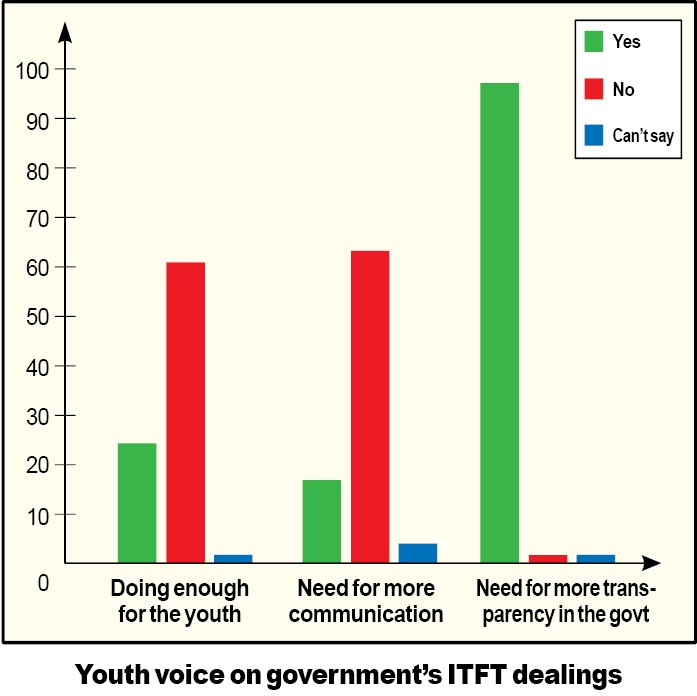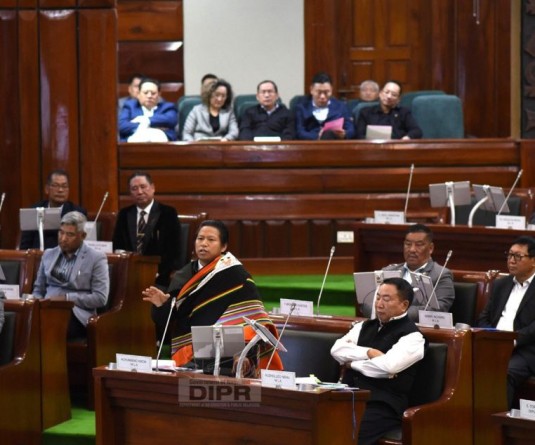
Dimapur, Aug 2 (MExN): Apart from highlighting managerial inconsistencies and students’ discontent in ITFT Chandigarh, Youthnet in its Nagaland Government-commissioned study also highlighted the government vis-à-vis Naga youths. On a question of what they think of the Government in general, 100% respondents agreed that the Government needs to be more transparent in its functioning. This is the only question where the youths agreed in toto. Lack of transparency is also one of the main reasons why youths tend to look at the Government with suspicion, Youthnet observed. In spite of the Government doing so much for youths especially in the year 2004-2006, 62% feels that the Government is not doing enough for them. This is a disturbing observation as these youths are themselves employed under the initiative of the Government. A majority number also feels that there is not enough communication between the Government and the youth.
Huyeto - Proper screening should be done so that it should be ‘right man for the right job’, this would lead people chosen for ITFT programme to get job satisfaction –which is most essential. I think ITFT has tricked our Government.
Ketouni Angami - Sorry not up to expectation.
Rokokieno Mor - Government should look into the recruitment/placement procedure of ITFT. Government should look into our staying condition at ITFT.
Moarenenla - There was no specialized training as specified in the papers. At the time of placement we had no option of choosing the line of work we wanted.
Akrie - Government has gone overboard with its ITFT plans. Should have done a thorough research before implementing this programme.
Olito Suni - The present training duration is too less.
Kekusenuo Retso - Government should send us to good institutes and not just for the heck of it. The Institute they sent us to, was not even recognized.
Robin - ITFT has not been sincere enough in teaching the students. All they want is to get rid of the students as soon as possible by placing the students in different companies against the wishes of the students.
John Kikon - Interview process at Nagaland should be made more strict and not just casual questions like name, hobby etc. Orientation programme should be made better.
Precilla - We need more professional trained faculty as some trainers had the same educational qualification as the students.
Lobani Patton - a. Better communication between ITFT and the Government needs to be established, which would also suggest that the government needs to do a better research of the Institute before sending batches.
1. Duration of training: Almost 95% commented on the duration of the training period, which was officially for three months but in reality after two months or so, the interviews for placement by companies started taking place. Considering even if a full three months course is given, for long term sustenance and job growth in service industry, at least nine months course is a must.
2. Random Placement: Placement procedure suffers from serious inadequacy. Within one and half month of the training, companies started interviewing the trainees on a random basis. Thus irrespective of whether a trainee is interested in that area of work, if a particular company chooses him/her, he/she has no other choice but to accept it. The hitch here being, once a trainee is being selected it is final and no second chance to sit for another interview is given. Any institute or placement agency, where private individuals pay fees and join, give the choice to its student to choose any area of work or company they want. The placement procedure of the institute seems to be arbitrary, capricious, and monopolizing. The trainees should be given full choice to choose and sit for interviews with companies they desire, as is the practice in any placement agency. And not vice versa.
3. Orientation at the Institute: The trainees are without any prior job experience and thus it cannot be assumed that they understand the job market and its demands. Cocooned in Nagaland and not understanding job beyond government jobs confines them to a certain way of structured working. A sudden exposure to a competitive private sector disturbs and displaces their mental faculty. It is thus imperative for the trainees to know the different areas of work, their prerequisites, job growth, type and nature of work and salary etc. The trainees also need to be acquainted to different companies that would hire them. A clear and transparent placement procedure would help the trainees trust the Institute. This would help them to prepare themselves and be sure of what they want and what to expect. This would help to do away with the cynicism and skepticism which many develop at one time or the other.
4. Obligation of the Government: Attrition rate of around 60% is sky rocketing. Pinching the State’s exchequer and causing displacement to many youths who are disillusioned. Does the Government have any moral obligation or social responsibility towards these youths? Are they duty bound to the youths? Or is it a one time training programme and thereafter left on their own to fend for themselves. The Government needs to specify this clearly so that the Government is not blamed for unforeseen circumstances in the future. If it is one time programme and Government is understood to have washed their hands off, it would be unfair as many of these youngsters have decided to venture out with the sole reason that they would be safe, sound and secured under the protection of the Government. Many youths who have been disillusioned blame the Government for ignoring them and the main reason being feeling neglected and no one to turn to when they needed help and advice. Government has to take a more proactive role in ensuring that the youths being sent under the aegis of this programme do not seem to be lurching in dark when faced with crises of any kind.
To what extend is the Government concerned? Is the Government aware of the small issues which might affect youth in the long run? If the Government feels it is obligated than a concrete monitoring strategy needs to be drawn and implemented.
5. Obligation of the Institute: Any Institute that the Government engages for this programme is duty bound. This is a serious programme investing on human resource and not some mere investment on inanimate object or some infrastructure. A wrong approach will have negative affect on lives of people directly. Priority should be given to trainees first than to the market demands. The concern of the Institute should be to give quality training to their students so that they should be able to sustain themselves in the long run. Packing off their trainees to hunger driven companies and demanding market, to gain brownie points for recording maximum placement would be shameful and unacceptable. The Institute is aware of the high drop out rates during the training and also after the placement. Is the Institute adopting any method to asses what is going on wrong where and rectify it if need be? This is perhaps one of the biggest programme on Youth Employment of the Government and an equally big amount of funds have been invested. No Institute should be tolerated or excused if this programme is taken lightly just because it is Government funded. The fund belongs to the people. Thus, apart from imparting professional training, it is also the duty of the Institute to assure that the Government and the trainees are satisfied.





